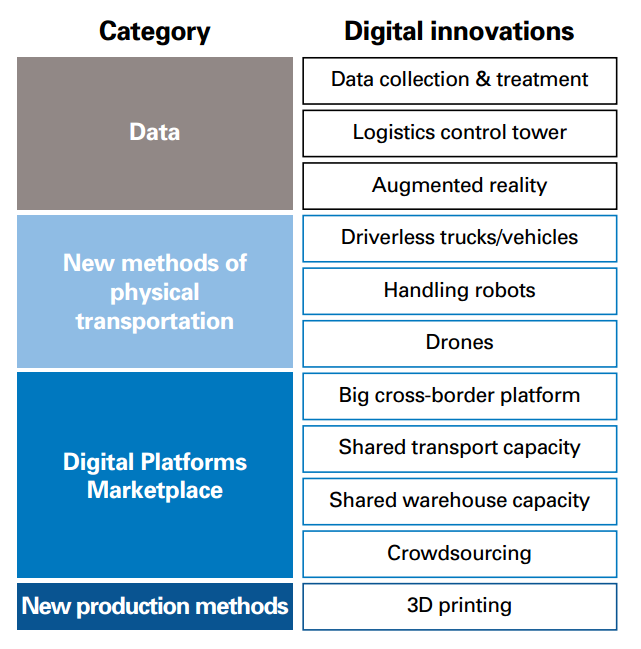DOWNLOAD
2 min read • Travel & transportation, Digital Shift
Logistics 4.0 – Facing digitalization- driven disruption

At a time of market transformation, legacy logistics players (LLPs) risk being held back by the weight of their past, with static organizations, old IT systems, and complex processes preventing them from competing. As Logistics 4.0 becomes a reality, how can LLPs set their future strategies and ensure they are focusing on the right areas to become digital champions? This article sets out a potential framework that players can use to manage competing priorities and ensure that investments deliver digital transformation.
In the past, legacy logistics players (LLPs) such as DHL, Kuehne + Nagel, DB Schenker, UPS and Nippon Express operated in a stable world, where efficiency, standardization and low cost were the keys to success. However, digitalization has changed this focus, transforming the market. New, digital-native entrants are better able to adapt to emerging imperatives such as agility, customer centricity and the need to constantly innovate. Legacy players risk being held back by the weight of their past, with static organizations, old IT systems, and complex processes preventing them from competing.
LLPs know they have to adapt, but find it difficult to change directions efficiently and with agility. They have the opportunity to choose from a wide range of technological innovations (from data analytics and drones to crowd sourcing), but can struggle to identify which innovations to adopt and which parts of their business models they should focus on if they are to transform, stay in the game and achieve competitiveness.
With limited resources and time, how should LLPs set their future strategies and ensure they are focusing on the right areas to become digital champions? This article sets out a potential framework they can use to manage competing priorities and ensure that investment delivers digital transformation.
Logistics 4.0: Tomorrow’s paradigm
Digital innovation enables logistics players to drive efficiency and lower costs, as well as pursue new business opportunities. This transformation is leading to a new paradigm called “Logistics 4.0,” which is based on four key trends:
Figure 1: Logistics 4.0 building blocks


2 min read • Travel & transportation, Digital Shift
Logistics 4.0 – Facing digitalization- driven disruption


At a time of market transformation, legacy logistics players (LLPs) risk being held back by the weight of their past, with static organizations, old IT systems, and complex processes preventing them from competing. As Logistics 4.0 becomes a reality, how can LLPs set their future strategies and ensure they are focusing on the right areas to become digital champions? This article sets out a potential framework that players can use to manage competing priorities and ensure that investments deliver digital transformation.
In the past, legacy logistics players (LLPs) such as DHL, Kuehne + Nagel, DB Schenker, UPS and Nippon Express operated in a stable world, where efficiency, standardization and low cost were the keys to success. However, digitalization has changed this focus, transforming the market. New, digital-native entrants are better able to adapt to emerging imperatives such as agility, customer centricity and the need to constantly innovate. Legacy players risk being held back by the weight of their past, with static organizations, old IT systems, and complex processes preventing them from competing.
LLPs know they have to adapt, but find it difficult to change directions efficiently and with agility. They have the opportunity to choose from a wide range of technological innovations (from data analytics and drones to crowd sourcing), but can struggle to identify which innovations to adopt and which parts of their business models they should focus on if they are to transform, stay in the game and achieve competitiveness.
With limited resources and time, how should LLPs set their future strategies and ensure they are focusing on the right areas to become digital champions? This article sets out a potential framework they can use to manage competing priorities and ensure that investment delivers digital transformation.
Logistics 4.0: Tomorrow’s paradigm
Digital innovation enables logistics players to drive efficiency and lower costs, as well as pursue new business opportunities. This transformation is leading to a new paradigm called “Logistics 4.0,” which is based on four key trends:
Figure 1: Logistics 4.0 building blocks




